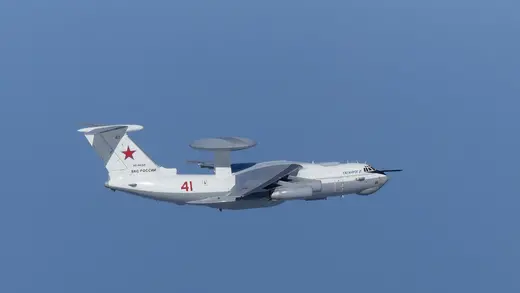South Korea-Russia Air Incident: What to Know
South Korea fired warning shots at a Russian warplane after it violated Seoul’s airspace over disputed islands. Here’s what that means for the region.
By experts and staff
- Published
By
- Scott A. SnyderSenior Fellow for Korea Studies and Director of the Program on U.S.-Korea Policy
Four of Asia’s major powers—China, Japan, Russia, and South Korea—squared off in a brief military confrontation on Tuesday. The unprecedented incident has jolted an already tense region.
What happened on Tuesday?
A Russian warplane violated South Korean airspace, marking the first such incident since the Korean War, according to South Korean defense officials. The A-50 aircraft on two occasions came within twelve nautical miles of the Dokdo/Takeshima islands, which are controlled by South Korea but also claimed by Japan.
During the first incursion, South Korean officials said they responded by scrambling fighter jets and firing eighty warning shots and ten flares. When Russian plane entered the airspace again, South Korean aircraft fired more flares and another 280 warning shots. Moscow, for its part, has denied that its plane entered South Korean airspace.
Earlier in the morning, Russian and Chinese bombers also violated South Korea’s Air Defense Identification Zone (KADIZ), a broader airspace extending for one hundred to two hundred miles adjacent to South Korea-controlled territory. The Chinese planes crossed the southwestern and northeastern portions of South Korea’s KADIZ toward Russia, where they met and flew together with the Russian planes back through the northeastern portion of South Korea’s KADIZ.
Why were Russian and Chinese planes in the region in the first place?

They were conducting a joint patrol of the area, according to Russia’s defense ministry, to “deepen Russian-Chinese relations” and “perfect” joint military capabilities. Russia and China have previously conducted joint war games in the East China Sea and Sea of Japan, but this marked their first joint air patrol in the region.
The patrol itself extended Chinese-Russian cooperation into an area that has long been defined by maritime competition between South Korea and Japan. The timing could suggest a willingness by Beijing and Moscow to exploit Seoul-Tokyo frictions for their own benefit.
Will this shift attention away from threats posed by North Korea?
While this incident momentarily distracts from North Korean threats, it also underscores that both relations with Pyongyang and regional dynamics affect South Korean security.
On the same day, North Korean media unveiled pictures of a prototype for a new submarine, a reminder that North Korea has sought to develop sea-based long-range missile launch capability in addition to land-based missile development.
Unless efforts to reduce tensions on the Korean Peninsula are accompanied by stable relations between regional powers—including China, Japan, and Russia—regional conflicts could undermine peace between North and South Korea.
What does this mean for the already rocky relationship between South Korea and Japan?
Russian planes flew dangerously close to the contested Dokdo/Takeshima islands. After the incident, Japan complained that South Korea violated its sovereignty by firing warning shots near the islands.
The territorial dispute is yet another manifestation of increased tensions between Tokyo and Seoul. Earlier this month, Japan restricted the export of materials critical to South Korea’s tech industry. The move was widely seen as a response to a South Korean Supreme Court decision that awarded damages to people forced to work in Japanese factories during the World War II era.
Regardless of whether the Russian-Chinese incursions were intentional, they are a reminder of how Japanese and South Korean interests could suffer if the U.S.-led security infrastructure erodes. Escalating regional rivalries could transform Northeast Asia from a hub of economic growth into one of geopolitical conflict.